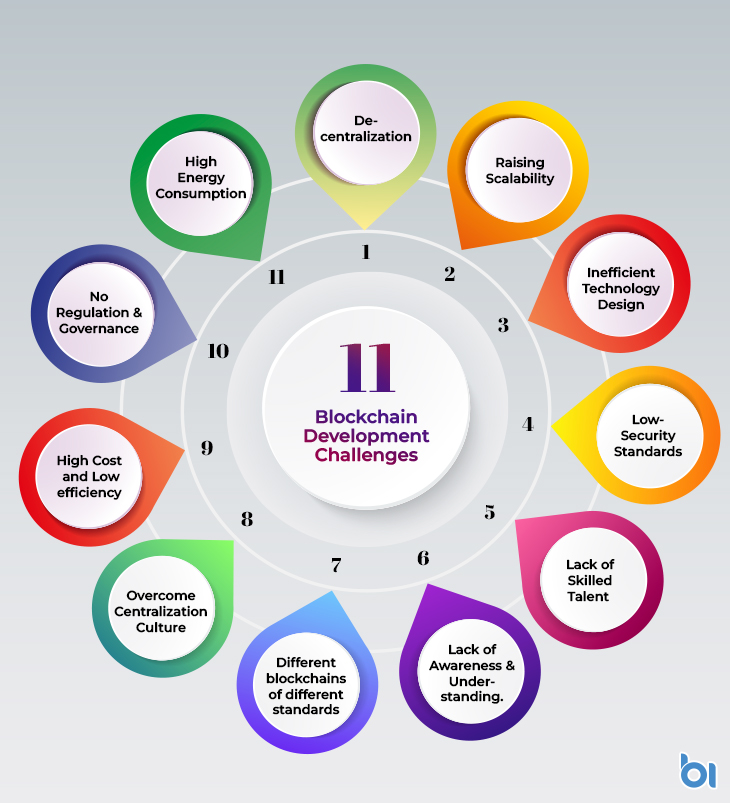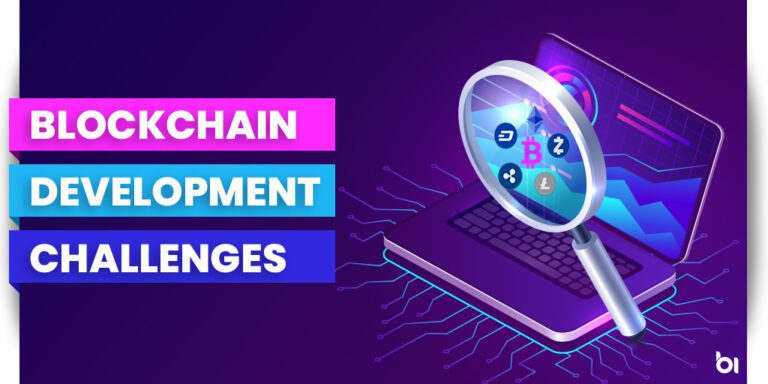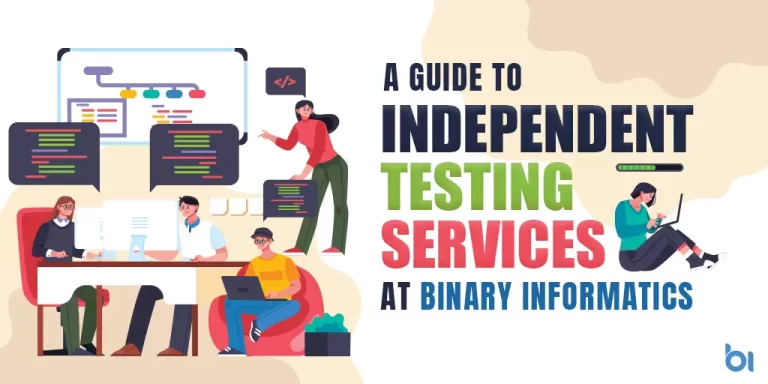Today we aim to flash light on blockchain development challenges but before that let’s see why the demand for blockchain development is rising.
Blockchain technology is incredibly high in demand. Despite the high demand for blockchain, its successful adoption rate is comparatively very low.
When businesses started to realize that investing in blockchain will streamline operations, break down data silos, improve transparency, and reduce transaction costs. Thus they strive to leverage, blockchain technology to boost their bottom line.
Ready to explore the blockchain technology challenges you must be aware of?
Table of Contents
Toggle11 Blockchain Development Challenges
As the blockchain ecosystem evolves and different use cases emerge, here are challenges the blockchain development challenges industry is struggling to address.

1. Decentralization
Decentralization is one of the main reasons behind the popularity and adoption of blockchain, but at the same time is a challenge for developers to attain efficiently. Blockchain solutions allow customers to store and purchase cryptocurrency without the need to give full control OVER their assets. The trade-off of decentralization is the amount of time it takes for multiple stages of confirmation to reach a consensus. Finding a way to speed up this process is challenging for the blockchain development team.
2. Raising Scalability
Another biggest blockchain development challenge is to increase block size without sacrificing speed.
Global adoption of blockchain hinges on its ability to handle a growing number of transactions as the demand increases—all while operating and defending itself from cyberattacks efficiently. Once again, speed get a trade-off, especially when block sizes grow.
Each coin in the blockchain ecosystem must be capable of recording an infinite number of transactions, with each transaction size of the block increasing. This could result in hindering processing speed, thus attaining scalability without sacrificing speed is one of the biggest challenges to overcome.
Read also : How Does Blockchain Help Businesses Grow Faster?
3. Inefficient Technology Design
This is one of the major blockchain development challenges to overcome. Although blockchain technology has a lot of perks, it still suffers from Inefficient Technology Design issues-coding flaws, or loopholes. Attackers utilize these loopholes and hack into the system quickly.
Bitcoin was the frontier in this ecosystem, but still, the whole system reeks of design inefficiency. Though Ethereum tried to cover up all the lackings of Bitcoin, it’s still not enough. Blockchain developers need to fix inefficient coding and design to implement a secure & speedy blockchain.
4. Low-Security Standards
Although security is one of the benefits of blockchain development is also a challenge for the development team to attain at its best. With the growing adoption of blockchain, the respective ecosystem is at a high risk of cybercrime.
The developers need to be able to create blockchain networks that not only add business value but also assure complete security.
Read also: 5 Aspects to Consider in Blockchain Software Development
5. Lack of Skilled Talent
The demand for blockchain development is increasing without a pause, but high-quality talents can be seen as a major challenging factor in the adoption of this technology. As the global demand for blockchain engineers is above 517% over the last year.
Despite tremendous achievements, Blockchain is still seen as a developing field though the industry is struggling with a talent shortage. An acute shortage of blockchain experts and developers that can manage and solve the complexity of peer-to-peer networks, is a significant concern for the industry.
6. Lack of Awareness & Understanding.
The principal challenge associated with blockchain technology is the lack of awareness. Sectors other than fintech, and a widespread lack of understanding of how to adopt it, and how it works. This is hampering potential investments and the exploration of possible grand opportunities & ideas.
7. Different blockchains of different standards
Organizations are rushed in developing their own blockchains and applications to gain a competitive edge over others. As they have been developed by many different organizations, give rise to many different blockchains of different standards. This makes the whole ecosystem inefficient as it defeats the purpose of distributed ledgers and fails to harness blockchain networks.
8. Overcome Centralization Culture
It has been estimated that blockchain adoption brings about 80 percent of changes to business processes and 20 percent to technology implementation. Blockchain brings a total shift to traditional ways of doing things. It places trust and authority in a decentralized network rather than in a powerful centralized institution. And for most, this big change & loss of control over the network can be deeply unsettling. So they resist adopting blockchain technology.
9. High Cost and Low efficiency
The speed and effectiveness with which blockchain networks can execute peer-to-peer transactions come with a high aggregate cost, which also varies per the type of blockchain.
For the Bitcoin network, the total running costs associated with validating and sharing transactions on the public ledger are estimated to be around $600 million a year excluding the capital costs associated with acquiring specialist mining hardware.
10. No Regulation & Governance
Regulation and governances have always struggled to keep up with going advances in technology. Even Bitcoin blockchain bypasses regulation completely to tackle system inefficiencies in conventional intermediated payment networks.
11. High Energy Consumption
Due to its high electricity consumption, proof-of-work cryptocurrency mining has not been welcomed warmly across the globe. Blockchains are found to consume an exorbitant amount of energy, for meeting algorithmic requirements followed for their creation.
According to Cambridge Center for Alternative Finance (CCAF) estimation, Bitcoin currently consumes around 110 Terawatt Hours per year — 0.55% share of global electricity production. Which is roughly equivalent to the annual energy consumption of a small country like Malaysia or Sweden.
Despite these challenges, technology has an intrinsic property of evolving and can always find a way through any challenges.
Final Thoughts On Blockchain Development Challenges
While there are so many challenges associated with blockchain development solutions, technology is constantly evolving, playing a crucial role in both the public and private sectors.
So, blockchain is not going anywhere anytime soon but will take time to overcome these Blockchain Development Challenges & revolutionize the technology sector completely.
If you are looking to explore blockchain consulting or development services, Binary Informatics(BI) can help you best. BI is the leading blockchain development company in USA that provides you with a range of decentralized applications that adds security and transparency to your business.
Is there anything more to Blockchain development challenges that you want to add to this list? Feel free to comment below!!




